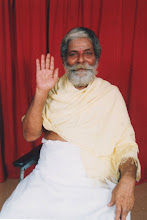Eekshathe yogayukthatma sarvatra samadarshinah || 6.29 ||
"With the mind harmonised by YOGA he sees the Self abiding in all beings, and all beings in the Self; he sees the same everywhere."
Yo mam pashyathi sarvatra sarvam cha mayi pashyathi |
Tashya aham na pranashyami sa cha me na pranashyathi || 6.30 ||
"He who sees Me everywhere, and sees everything in Me, he never gets separated from Me, nor do I get separated from him."
Sarvabhootha sthitham yo mam bhajathekatwamasthitah |
Sarvatha varthamanopi sayogi mayi varthathe || 6.31 ||
"He who, being established in unity, worships Me, dwelling in all beings, that YOGI abides in Me, whatever be his mode of living."
Atmaoupamyena sarvatra samam pashyathi yo arjuna |
Sukham vaa yadhi vaa dukham sa yogi paramo mathah || 6.32 ||
"He who, through the likeness (sameness) of the Self, O Arjuna, sees equality everywhere, be it pleasure or pain, he is regarded as the highest YOGI."
Meaning:
The man of perfect self-knowledge, is not merely one who realized his own divinity, but is also one who has equally understood and has come to live in an experience of the divinity inherent in all creatures, without any distinction whatsoever. The awareness in us is the awareness everywhere in all names and forms. To contact the infinite in us, is to contact the Eternal everywhere. Just as the mud in all mud-pots, the gold in all gold ornaments, the ocean in all waves, the electricity in all bulbs, the Self is the Essence in entire world of objects.
The meditator, on transcending his intellect, becomes the Self, and to the Self there is nothing but the Self everywhere. To the mud, there are no pot; to the gold, there are no ornaments separate from itself. Such a Perfect One, who has realized the Unity in the world of diversity, can afford to entertain the equality of vision in all circumstances and conditions. On transcending the intellect, the experience of the ego is not that it sees or perceives the Eternal but that it discovers itself in essence to be nothing but the Self(Shivoham). The dreamer, on awakening, himself becomes the waker, the dreamer can never see the waker as separate from himself.
The Lord also says that, not only the seeker come to feel the Self-hood, But I, the Self, become one with him. An actor playing the part of a beggar, is not really a beggar. The moment he drops the part he is playing, he becomes what in fact he is. In fact, even while he was playing his role, he was not a beggar. Work, in fact, can be performed only when the worker is established in the Self. Such an individual, whatever be his activities in the external world, ever established in Self through a conscious awareness of the Self. He can maintain his divine consciousness in all states of existence, in all conditions of life and under all happy or unhappy circumstances. Everything experienced in the gross world outside, and in the subtle realm within, is nothing but an emanation from the Eternal Self.
The Yogi, after his experience of the Self, comes to recognise the whole world as nothing but himself. As all the limbs and parts of one's body are equally dear to an individual, one can easily experience one's intimate identity with all the different parts of the body. If your tongue were to be accidentally bitten by your own teeth, you would never think of punishing the teeth for the crime they had done, for, both IN the tongue and IN the teeth you pervade equally. Such an individual, who has in his realisation come to feel the entire universe as his own form, is called a true Yogi.
My meaning:
The true Yogi, experiences the Self everywhere, in everything, in every circumstances. He comes to realize the Self in everything, and everything in Self. With the pure awareness this can be experienced. We are all part of the that big ocean, the Self. For everything happening good or bad, we are only responsible since one wave affects the other wave in the big ocean. If we give pain to others, it also hurts us and if we share the happiness, we also feel happy, why? Why because we are all connected in inner world. So If we realize this, there is no more wars, no more complaints about others, no more sorrows, all these are ended. The true Yogi experience the Self in all circumstances,equally in pleasure or pain. He accepts everything as they are. If we realize this truth, we are free from ego, and liberated ones.




